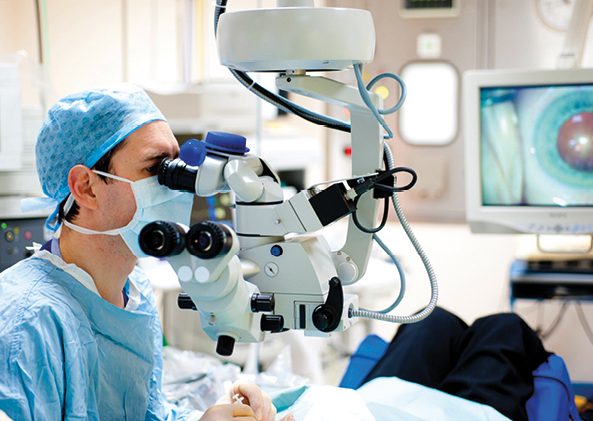Ophthalmology is a branch of medicine dealing with the diagnosis, treatment and prevention of diseases of the eye and visual system. The eye, its surrounding structures and the visual system can be affected by a number of clinical conditions.
Eye health services are coming under increased pressure as the UK population ages. An ageing population means there are more incidences of age-related diseases of the eye, such as glaucoma, age-related macular degeneration (AMD) and people developing cataracts. Some eye diseases can be successfully treated if caught early, and can be managed effectively with existing treatments and medicines. Innovative research into eye diseases is leading the way to new treatments. Sight can often be treated and preserved and this means patients being seen regularly in the hospital eye service or in a community setting.
Cataracts are the main cause of impaired vision worldwide, and in England and Wales it is estimated that around 2.5 million people aged 65 or older have some degree of visual impairment caused by cataracts. Cataract surgery is the most common operation performed in the NHS in England and Wales with over 400,000 procedures performed each year.
What eye clinics deal with
Typically, ophthalmologists and the eye care team, including orthoptists, optometrists, technicians and nurses will manage patients with some of the most prevalent eye diseases in the world: from cataracts, glaucoma and age-related macular degenerations to rarer forms of conditions such as Charles Bonnet Syndrome and Nystagmus.
Patients with eye emergencies are typically triaged in an A&E department. In larger hospitals, a separate eye casualty department is staffed by ophthalmologists and/or nurse practitioners. Patients may present with a variety of conditions from a simple foreign body on the cornea, to sight-threatening conditions such as chemical burns, angle-closure glaucoma, blockage to the blood supply to the retina, and retinal detachment. Even patients with brain tumours may first present at an eye casualty department.
Innovation
Innovative technologies for imaging the eye help to diagnose and treat many conditions, and there have been numerous advances in microsurgical techniques that have improved surgical outcomes. Novel treatments for degenerative diseases of the retina give hope to patients with a previously poor prognosis. Continuing developments and research make it a fascinating time for the specialty.
Find out what ophthalmologists do
Ophthalmologists work with other medical and healthcare professions, often leading the multidisciplinary team. Ophthalmologists are experts in the diagnosis, treatment, surgery and management of eye disease to preserve the sight of patients and their quality of life.
Find out about a career in ophthalmology
Our resources and courses
Whether you’re a GP supporting a patient with sight loss or a foundation doctor seeing a patient in the A&E department who has presented with an acutely painful red eye, ophthalmology skills are an essential part of patient care. Whether you’re considering training in ophthalmology or just looking for a refresher, there’s a course for you at RCOphth.
Thinking about a career in ophthalmology? Then take a look at our curriculum for undergraduate and Foundation Doctors. It lists the core clinical skills, knowledge and objectives to help direct your learning, find out about your medical school’s specific objectives for ophthalmology. The RCOphth’s Careers in Ophthalmology is a helpful guide and explains what you can expect from training and a career in the specialty.
The RCOphth provides a comprehensive programme of education and training, resources and guides.

